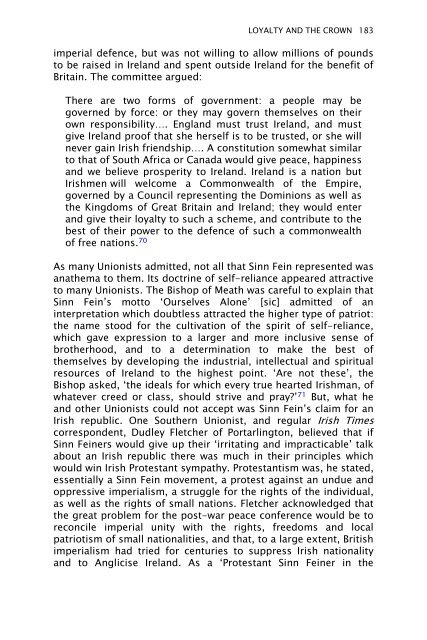Dividing Ireland: World War I and Partition
Dividing Ireland: World War I and Partition
Dividing Ireland: World War I and Partition
Create successful ePaper yourself
Turn your PDF publications into a flip-book with our unique Google optimized e-Paper software.
LOYALTY AND THE CROWN 183<br />
imperial defence, but was not willing to allow millions of pounds<br />
to be raised in <strong>Irel<strong>and</strong></strong> <strong>and</strong> spent outside <strong>Irel<strong>and</strong></strong> for the benefit of<br />
Britain. The committee argued:<br />
There are two forms of government: a people may be<br />
governed by force: or they may govern themselves on their<br />
own responsibility…. Engl<strong>and</strong> must trust <strong>Irel<strong>and</strong></strong>, <strong>and</strong> must<br />
give <strong>Irel<strong>and</strong></strong> proof that she herself is to be trusted, or she will<br />
never gain Irish friendship…. A constitution somewhat similar<br />
to that of South Africa or Canada would give peace, happiness<br />
<strong>and</strong> we believe prosperity to <strong>Irel<strong>and</strong></strong>. <strong>Irel<strong>and</strong></strong> is a nation but<br />
Irishmen will welcome a Commonwealth of the Empire,<br />
governed by a Council representing the Dominions as well as<br />
the Kingdoms of Great Britain <strong>and</strong> <strong>Irel<strong>and</strong></strong>; they would enter<br />
<strong>and</strong> give their loyalty to such a scheme, <strong>and</strong> contribute to the<br />
best of their power to the defence of such a commonwealth<br />
of free nations. 70<br />
As many Unionists admitted, not all that Sinn Fein represented was<br />
anathema to them. Its doctrine of self-reliance appeared attractive<br />
to many Unionists. The Bishop of Meath was careful to explain that<br />
Sinn Fein’s motto ‘Ourselves Alone’ [sic] admitted of an<br />
interpretation which doubtless attracted the higher type of patriot:<br />
the name stood for the cultivation of the spirit of self-reliance,<br />
which gave expression to a larger <strong>and</strong> more inclusive sense of<br />
brotherhood, <strong>and</strong> to a determination to make the best of<br />
themselves by developing the industrial, intellectual <strong>and</strong> spiritual<br />
resources of <strong>Irel<strong>and</strong></strong> to the highest point. ‘Are not these’, the<br />
Bishop asked, ‘the ideals for which every true hearted Irishman, of<br />
whatever creed or class, should strive <strong>and</strong> pray?’ 71 But, what he<br />
<strong>and</strong> other Unionists could not accept was Sinn Fein’s claim for an<br />
Irish republic. One Southern Unionist, <strong>and</strong> regular Irish Times<br />
correspondent, Dudley Fletcher of Portarlington, believed that if<br />
Sinn Feiners would give up their ‘irritating <strong>and</strong> impracticable’ talk<br />
about an Irish republic there was much in their principles which<br />
would win Irish Protestant sympathy. Protestantism was, he stated,<br />
essentially a Sinn Fein movement, a protest against an undue <strong>and</strong><br />
oppressive imperialism, a struggle for the rights of the individual,<br />
as well as the rights of small nations. Fletcher acknowledged that<br />
the great problem for the post-war peace conference would be to<br />
reconcile imperial unity with the rights, freedoms <strong>and</strong> local<br />
patriotism of small nationalities, <strong>and</strong> that, to a large extent, British<br />
imperialism had tried for centuries to suppress Irish nationality<br />
<strong>and</strong> to Anglicise <strong>Irel<strong>and</strong></strong>. As a ‘Protestant Sinn Feiner in the








